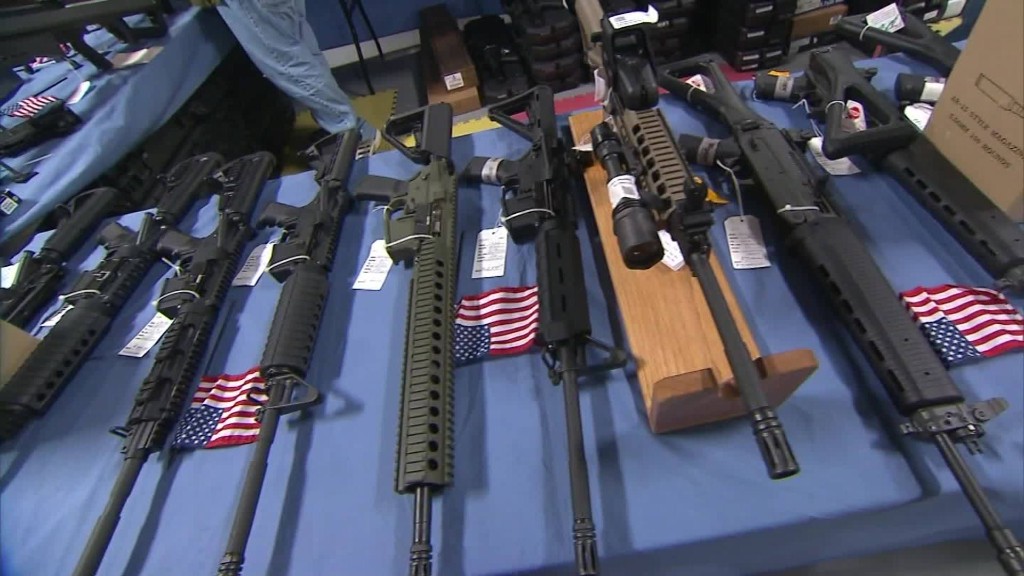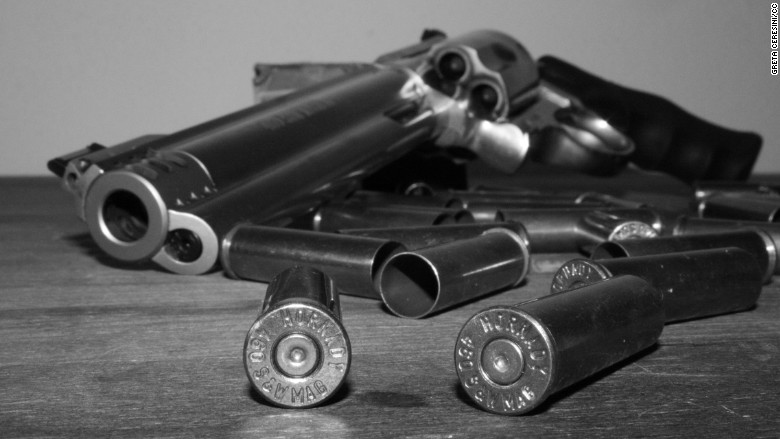Under federal and many state laws, the same people prohibited from buying guns are prohibited from buying bullets. But virtually no systems are in place to enforce that. In 46 states, anyone can walk into a store -- or click on a website -- and buy bullets, no questions asked.
Earlier this week President Obama announced a series of executive actions on gun control -- a frank acknowledgment of the political impossibility of getting even the most modest gun background check bills through Congress. The idea that states could enforce background checks for those buying bullets seems far-fetched.
Not so in California. "If someone isn't allowed to possess ammunition, we should probably make sure they can't buy it," says Yashar Hedayat, a spokesman for Lt. Gov. Gavin Newsom, a Democrat, who is spearheading a new effort on ammunition purchases.
That effort, the Safety for All Act, would require a background check for anyone seeking to buy bullets, using the same system as the existing one for guns. The proposed new law includes several other gun control provisions, including new regulations for ammunition dealers. The state -- plus 44 others and the federal government -- currently has no licensing or regulation for those who sell bullets.
"We're not being hyperbolic when we say that a daycare center could sell ammunition," Hedayat says.
The ballot initiative is currently being reviewed by the state's Attorney General. In the next few months the campaign will begin gathering the requisite signatures to put the initiative before voters in the fall.
Tightening gun restrictions through traditional legislative channels has been a frustrating dead end for gun-control proponents. In the years since the mass school shooting in Newtown, Conn., far more laws have been passed to loosen gun regulations than to strengthen them. But the Safety for All Act bypasses the state legislature by going directly to voters. A similar tack worked in Washington state in 2014, when a ballot initiative to close that state's gun show loophole passed with almost 60 percent of the vote.
Gun rights supporters essentially conceded that contest, contributing only $500,000 to fight the initiative in the face of at least $6 million in spending by Everytown for Gun Safety and other gun control groups. Proponents of the Safety for All Act say they are gearing up to spend more than that this time around.
The opposition is also planning a sizable, and expensive, fight in California. "Gavin Newsom seriously underestimated the fervor of opposition," says Mark Selmi, a spokesman for Michel & Associates, the law firm that represents the National Rifle Association in California. "There will be a consolidated opposition, including a large number of county sheriffs and a record voter turnout." Fundraising has already begun on Second Amendment social media accounts.

California has some of the nation's strictest gun control laws, and the state is something of a bellwether for how far gun-control advocates can push before they are beaten back, in the courts or elsewhere. On the issue of regulating ammunition, gun-control proponents point to ordinances in Sacramento and Los Angeles that require ammunition sellers to maintain records of people who buy bullets and to make those records available to police. (Law enforcement has since begun to use the logs in investigations and prosecutions of those prohibited from owning bullets who bought them anyway.)
Gun rights advocates, meanwhile, point to a successful court challenge of a law that would have applied these provisions statewide.
A small group of gun-control advocates have, for years, been making the case that bullets are as good, if not better, a target for regulation than guns. Without bullets, they point out, a gun is a useless piece of metal. And unlike guns, bullets must continually be replaced. "If I buy a firearm, I take good care of it, it can last a lifetime," says Garen Wintemute, an emergency physician and Director of the Violence Prevention Research Program at the University of California, Davis. "The larger share of the market is in the consumables, like ammunition."
But this is a fledgling idea in a landscape where 37 states don't require background checks to purchase a handgun -- let alone a box of ammo. "In most states, we're actually starting from even further behind," says Ari Freilich of the Law Center to Prevent Gun Violence, a think tank that worked with Newsom to formulate the policy ideas in the Safety for All Act. "Before they can impose ammunition background checks, they also have to talk about firearms background checks as well."
Four states and the District of Columbia require a license to buy ammunition, and getting that license requires passing a background check. But once you have the license, "you have it until it expires," Freilich says. "There are processes to revoke the license, but generally speaking, it's hard to do that."
The proposed new system in California would require a background check at every purchase, and would draw on the database of prohibited purchasers, updated in real time, that the state already uses for gun sales.
In 2013, New York state passed the SAFE Act, a similar law that would have required ammunition buyers to pass a background check at the point of purchase. But unlike California, which has stricter rules than the federal government's and maintains its own prohibited gun buyers database, New York relies on the federal background check system, known as NICS. Federal officials said the Brady Act — which established the system of firearm background checks — does not allow NICS to be used for bullets. The SAFE Act is now in limbo until the state police can develop its own statewide database. "New York does face administrative hurdles in putting a new, comprehensive background check database together," Freilich says — "though I do believe political opposition has hindered the process."
This article was originally published by The Marshall Project, a nonprofit news organization that covers the U.S. criminal justice system. Sign up for their newsletter, or follow The Marshall Project on Facebook or Twitter.

